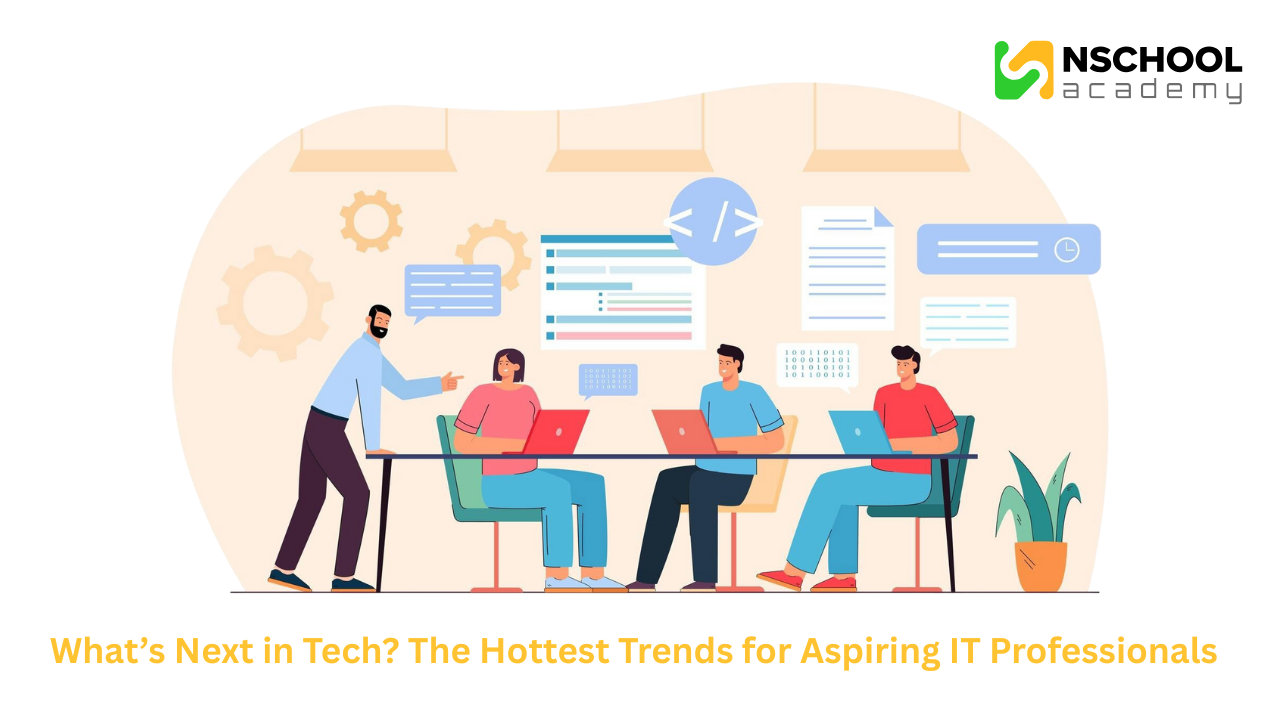Trends for Aspiring IT Professionals
- May 28, 2025
- nschool
- 0

What’s Next in Tech? The Hottest Trends for Aspiring IT Professionals
In today’s tech-driven world, adapting to new innovations is key. As industries quickly change, the need for skilled IT professionals is growing. New technology trends are not only changing our daily lives but also reshaping and updating jobs in the IT field. Anyone aiming for a career in information technology must understand these changes and learn how to adapt; it’s very useful for your career growth.
1. The Rise of Artificial Intelligence and Machine Learning
Artificial intelligence (AI) and machine learning (ML) are driving advanced changes in technology. And updating new features in the IT field. These smart systems are used in many business tasks, like automating customer support and predicting future trends. In IT, AI helps monitor networks, find problems, and manage resources better.
If you want to work in this field, learning the basics of AI and ML will give you an advantage. Knowing programming languages like Python and tools like TensorFlow or PyTorch is very helpful foe your career. Understanding how AI works is becoming important for jobs in data science, IT automation, and software development.
2. Cloud Computing: The New Normal in IT Infrastructure
Cloud computing has become essential, forming the base of IT systems in almost every field and platform. Leading cloud platforms like Amazon Web Services (AWS), Microsoft Azure, and Google Cloud are used to run business apps and analyze data in real time.
As more companies move to cloud-based tools, new job opportunities are opening up in areas like DevOps, cloud design, and security. Learning how to use and manage cloud services is now an essential skill for anyone working in IT. Getting certified in cloud platforms can also help you stand out and get better job offers in the tech field, and it’s helpful for your career.
3. Cybersecurity: A Growing Priority in Technology
With the rapid growth of digital platforms, cybersecurity has become a central concern for organizations. As cyberattacks grow more sophisticated, businesses are investing heavily in secure IT infrastructure and data protection mechanisms.
Aspiring professionals in IT and technology should understand security fundamentals, including encryption, access control, firewalls, and incident response. Cybersecurity skills are no longer limited to security roles—they are now a must-have across all IT positions, from developers to system administrators.
4. DevOps and Automation for Agile IT Operations
DevOps is a modern way of handling software development and IT operations together. Instead of keeping these two areas separate, DevOps brings them together to make software delivery faster and more reliable. Automation is a key part of this process. Tools like Jenkins, Docker, Kubernetes, and Ansible help teams deploy software quickly and with fewer mistakes.
If you’re starting a career in IT, learning about DevOps and automation tools is very important. Many companies now want people who understand how to set up continuous integration and delivery (CI/CD), check the health of systems, and use automation to make things run more smoothly and reliably.
5. Full Stack Development: A Versatile Skillset
In today’s tech-focused world, full-stack developers are highly sought after. These experts can handle both the front-end (what users see) and the back-end (how things work behind the scenes) of websites and apps, making them very useful in any project.
Learning programming languages like JavaScript, HTML, and CSS, along with tools like React, Angular, and Node.js, can lead to many job opportunities.
Companies like full-stack developers who can help with every part of the software process—from designing user interfaces to connecting with databases.
If you’re planning a career in IT, becoming a full-stack developer is a smart choice.
6. Data Science and Analytics: The Power of Insights
Data is very important for making smart choices in every type of job. Knowing how to read and show data in a simple way is a great skill to have. Data scientists use technology tools to find useful facts, make guesses about what might happen, and help with planning. Some common tools they use are Python, R, Power BI, Tableau, and SQL.
Even if you’re not a data scientist, being comfortable with data is still helpful in information technology (IT). Whether you work in software development, cybersecurity, or managing systems, understanding data can help you do your job better and grow in your career.
7. Edge Computing and IoT: Real-Time Technology at the Source
Edge computing is changing the way we use data by moving the processing closer to where the data is made—like in smart devices, sensors, or self-driving cars. This helps reduce wait times and allows faster decisions, which is very useful in areas like healthcare, factory work, and smart vehicles.
Edge computing often works together with the Internet of Things (IoT). Devices like smartwatches, home thermostats, and factory machines use local processing to run faster and more smoothly.
If you’re starting a career in information technology (IT), it’s a smart idea to learn about embedded systems, how IoT devices talk to each other, and how edge networks work. This field is expanding quickly and provides plenty of career opportunities.
8. Blockchain and Decentralized Technology
Blockchain is one of the most powerful new technologies in recent years. It was first made for digital money like cryptocurrencies, but now it’s also used in areas like supply chains, digital ID checks, and smart contracts.
Learning how blockchain works—such as its shared record system and how it agrees on changes—is helpful for jobs in cybersecurity, finance, and IT systems. If you’re interested in building with blockchain, tools like Solidity, Ethereum, and Hyperledger Fabric are good to learn.
9. The Future of Remote Work and Virtual Collaboration
After the pandemic, remote work has become more common, and IT professionals have played a big role in making it happen. Tools like Zoom, Microsoft Teams, Slack, and cloud-based project management software are now a normal part of daily work.
As remote work continues to grow, IT jobs will more often include setting up and managing online workspaces, keeping remote connections safe, and helping teams that work from different locations.
10. Soft Skills for Tech Professionals
In IT jobs, having technical skills is important—but soft skills are just as valuable. Skills like good communication, teamwork, problem-solving, and being flexible help people do well in busy, team-based work settings.
Today’s tech professionals often work with different departments, explain complex ideas in simple ways, and handle new problems quickly. Building these soft skills can help your career grow just as much as learning new technical tools.
Conclusion: Trends for Aspiring IT Professionals
The field of technology is growing fast, and so are the job opportunities in IT. For people who want to build a career in this area, the most important things are learning all the time and being open to change. Popular areas like artificial intelligence (AI), cloud computing, full-stack development, and data science offer many exciting paths to follow.
Start by choosing one topic that interests you and learning the basics. Keep asking questions, earn certifications, and try hands-on projects. As the world becomes more digital, people with strong and current IT skills will be in high demand.
Whether you’re a student, just graduated, or changing careers, now is a great time to get into technology and build a successful future in IT.

